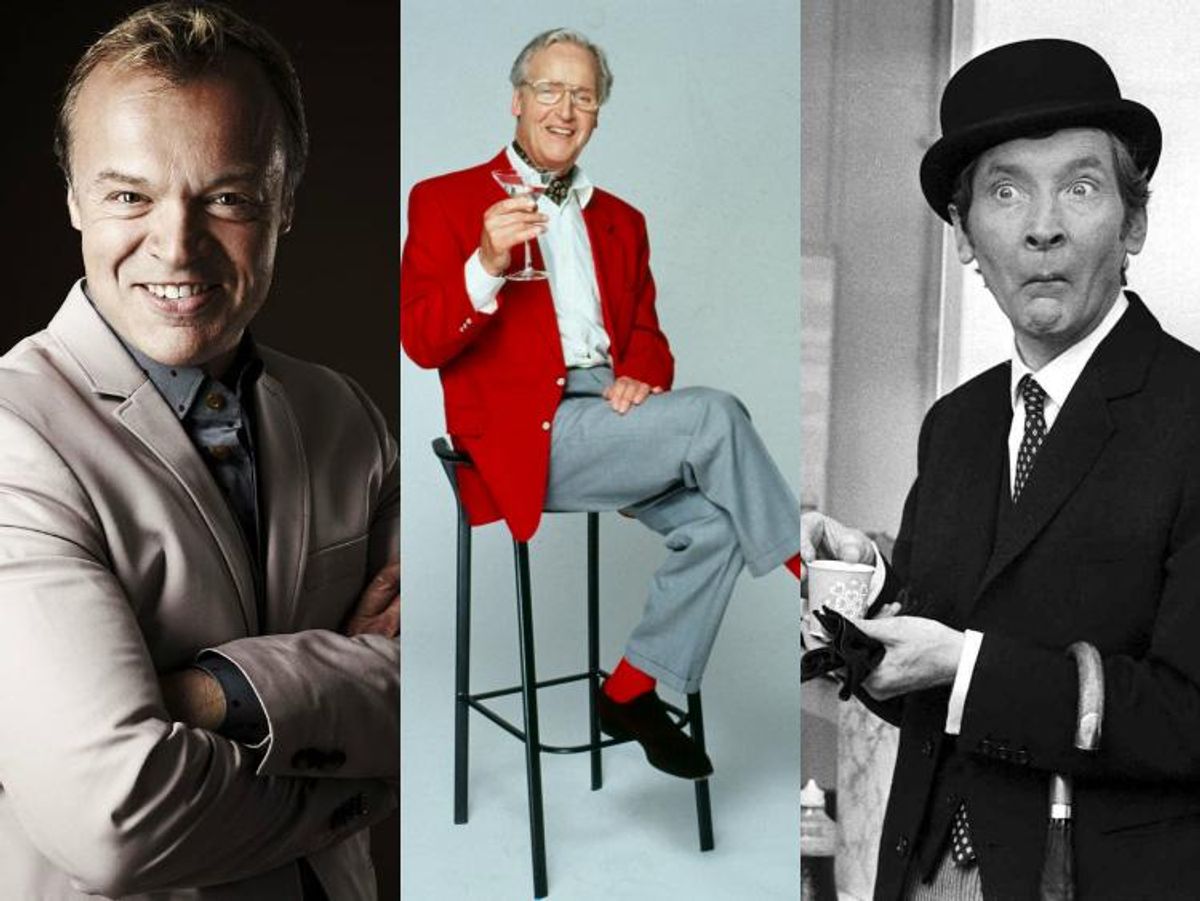
Thanks to the Internet, we, too, can enjoy Britain's longest-running radio show.
February 24 2015 4:44 AM EST
February 24 2015 10:26 AM EST
aaronhicklin
By continuing to use our site, you agree to our Private Policy and Terms of Use.

Thanks to the Internet, we, too, can enjoy Britain's longest-running radio show.
Photo: from L to R: Graham Norton, Nicholas Parsons, Kenneth Williams
If you think of Britain as a nation of camp, erudite wits spitting out bon mots over the Darjeeling (yes, Dowager Countess, we're looking at you), you would find all your stereotypes reinforced by Just a Minute, a game show on BBC Radio 4 that has just entered its 71st season. And that is not a typo. Just A Minute premiered in 1967, the year The Beatles released Sergeant Pepper's Lonely Heart's Club Band, two years before Neil Armstrong took his giant step for mankind. The show still has the same host, 91-year-old Nicholas Pasons, who plays a kind avuncular parent to a rowdy panel of oversized teenagers.
A throwback to an era when language was prized, and the raconteur was king (or queen), Just A Minute represents 30 minutes of manic wordplay that veers back and forth from the puerile to the pedantic. If you need evidence, go to the BBC Radio 4 site, and locate episode one of the latest series, here, for half an hour of the witties radio in the world. This is what you will hear: sprightly nonagenarian Parson with four contestants whose challenge it is to speak for one minute on a given subject without hesitating, deviating from the topic, or repeating any word (other than those in the subject heading) twice. This is as hard as it sounds, and the person who makes it to the end is a rare bird indeed. In the recent episode the actor David Tennant, best known as Doctor Who, succeeded in doing just that--in his maiden appearance. Not even an acclaimed wordsmith like Sir Stephen Fry (also in the same episode) has pulled that off).
But here is the real pleasure of Just A Minute: it wallows gleefully in a camp sensibility, rooted in a history of gay contestants, ranging from the actor Kenneth Williams, a towering (and tragic) figure in British comedy--he died of an overdose in 1988--to Sue Perkins, and from Graham Norton to Julian Clary, two comedians who have made an art form of innuendo. Here is Clary, in this week's episode, talking on the subject of "A banana skin."
"I was walking down Old Compton Street recently and before I knew it I was flat on my back with my legs in the air, and it was a banana skin that was to blame... I once nibbled on the actual skin of a banana, and I can't say I enjoyed it. It stuck to the roof of my mouth."
Innuendo like this works better on radio, partly because it relies on delivery. It's the arch manner in which Clary says "flat on my back with my legs in the air" that conveys the meaning Clary intends it to. There was no better exponent than this than the much-loved former panelist Kenneth Williams, best known in the UK for his extraordinarily elastic face that animated a franchise of racy movies in the 50s and 60s. Like Clary, Williams was also gay. In an age of repression and rampant homophobia, he channelled his homosexuality into a brazenly camp performance that still sounds risque today.
As the cultural critic Mark Simpson says, "Words and wit still matter on the wireless. Medium wave is the last best hope of humanity in a visual culture busily blitzing our sensibilities." Simpson is spot on. One of the great things about radio, and it's young sibling, the podcast, is the way it frees us from the tyranny of the image. As a medium it's unconcerned with how people look, and that's why the truly talented do so well there. At 91-years-old Nicholas Parsons appears on the radio today much as he did in 1967. If anything, age is a virtue. Is there anyone on TV who can say the same?
Sexy MAGA: Viral post saying Republicans 'have two daddies now' gets a rise from the right